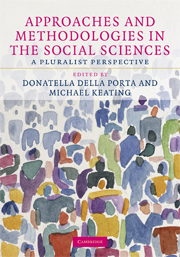Book contents
- Frontmatter
- Contents
- List of figures
- List of tables
- Contributors
- Preface
- 1 Introduction
- Part I Epistemology and philosophy of the social sciences
- Part II Research design
- 10 Concepts and concept formation
- 11 Comparative analysis: case-oriented versus variable-oriented research
- 12 Case studies and process tracing: theories and practices
- 13 Quantitative analysis
- 14 The design of social and political research
- 15 Ethnographic approaches
- 16 Comparing approaches, methodologies and methods. Some concluding remarks
- References
- Glossary
- Index
12 - Case studies and process tracing: theories and practices
Published online by Cambridge University Press: 05 June 2012
- Frontmatter
- Contents
- List of figures
- List of tables
- Contributors
- Preface
- 1 Introduction
- Part I Epistemology and philosophy of the social sciences
- Part II Research design
- 10 Concepts and concept formation
- 11 Comparative analysis: case-oriented versus variable-oriented research
- 12 Case studies and process tracing: theories and practices
- 13 Quantitative analysis
- 14 The design of social and political research
- 15 Ethnographic approaches
- 16 Comparing approaches, methodologies and methods. Some concluding remarks
- References
- Glossary
- Index
Summary
Introduction
A significant part of what we know about the social and political world comes from case studies. Case studies famously contributed, for instance, to uncovering the tendency towards oligarchy in political parties, the inner working of the exercise of power in democracies, the dynamics of international crises, the logics of authority and control in organizations, the interplay between values and institutions in the Indian caste system, the sources of success and failure of deterrence, and the causes of social revolutions (Michels 1911; Dahl 1961; Crozier 1964; Dumont 1970; Allison 1971; George and Smoke 1974; Skocpol 1979). Beyond these classical and influential works, the case study research tradition remains popular as researchers explore the political development of imperial Germany in comparative perspective, the causes and characteristics of nuclear accidents, the 1986 Challenger launch disaster, the evolution of institutions, the role of reputational claims in foreign policy decision-making or the genesis of the welfare state (Esping-Andersen 1990; Sagan 1993; Mercer 1996; Vaughan 1996; Berman 2001; Thelen 2004; for more examples, see Feagin, Orum and Sjoberg 1991; George and Bennett 2005: 287–325; Gerring 2007: 2–5). In international relations, case studies have made a central contribution to both the international security and the international political economy subfields (Snyder 1989; Kacowicz 2004; Odell 2004).
- Type
- Chapter
- Information
- Approaches and Methodologies in the Social SciencesA Pluralist Perspective, pp. 223 - 239Publisher: Cambridge University PressPrint publication year: 2008
- 113
- Cited by

